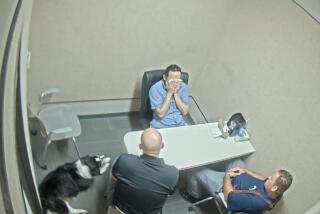Defense Survey Shows 63% Believe He’s Guilty : Poll Claims Most Know of Peyer Murder Charge
- Share via
A pollster testified Monday that a telephone survey conducted last month showed that 95% of those questioned in the county said they were aware of the murder charge filed against former California Highway Patrol Officer Craig Peyer, and 63% of those familiar with the case believed that he killed San Diego State University student Cara Knott.
Oscar Kaplan, an SDSU psychology professor and director of survey research at the university, testified as a witness for the defense and said the poll was taken between Oct. 6-11. Kaplan said the results were taken from responses given by 400 people interviewed out of 969 calls made by six assistants to every telephone prefix in the county.
Kaplan’s methodology in conducting the poll was immediately attacked by Deputy Dist. Atty. Thomas McArdle, who at one point charged that Kaplan put a “verbal gun” to the heads of people who were interviewed in order to manipulate the results in favor of the defense.
The SDSU professor was the first witness called Monday at a Superior Court hearing where Peyer’s attorneys are arguing for a change of venue. Defense attorneys Diane Campbell and Robert Grimes have argued that extensive pre-trial publicity has made it impossible for Peyer to receive a fair trial in the county.
Victim was Strangled
Peyer, 37, is charged with killing Knott, 20, on Dec. 27, between 9 and 10 p.m. Police said that Knott was strangled and her body thrown 65 feet into a dry creek bed on the Old U.S. 395 bridge near the Mercy Road off-ramp and Interstate 15.
McArdle and Kaplan sparred frequently over the poll, which Kaplan said was one of more than 2,000 surveys he has done in the last 45 years. At one point, McArdle charged that Kaplan’s data resulted from “shoot from the lip” responses of those polled. The prosecutor criticized Kaplan for not asking respondents if they thought they knew enough about the case to form an opinion.
Kaplan acknowledged that people frequently form opinions about issues of which they are generally ignorant and admitted that he did not know if those polled knew enough about the case to form an opinion on Peyer’s guilt or innocence.
Earlier in the hearing, McArdle asked Kaplan if he did not agree that the possibility of a fair trial should be based only on the evidence presented in the courtroom.
‘Considerable Baggage’
“Individuals (jurors) come into the courtroom with a considerable amount of baggage,” said Kaplan. “ . . . It influences what one hears and does not hear.”
McArdle later asked Kaplan whether failing to ask people if they could disregard what they had heard about the case and could judge Peyer solely on the evidence presented in court was important.
“No,” Kaplan said sternly.
McArdle promptly pulled a transcript from a 1978 hearing for convicted murderer Robert Harris. Kaplan conducted a public opinion poll for prosecutors in that case, which also involved a change-of-venue motion. In the Harris case, Kaplan testified that asking people if they could judge Harris’ guilt or innocence solely on the evidence was “the most critical question of all” in the poll.
The prosecutor asked Kaplan to explain his conflicting opinions on the same question, asked nine years apart.
“I no longer cling to that (1978) opinion,” Kaplan said.
On Monday, defense attorney Campbell attempted to question Kaplan about the conclusions that he reached in the polls he has conducted in other high-profile murder cases. However, she was abruptly cut off by Judge Richard Huffman.
“I don’t know why I should care what Dr. Kaplan concluded,” Huffman said.
Huffman, who was recently appointed to the Superior Court bench, was the prosecutor in the Harris case. Harris’ attorneys went all the way to the California Supreme Court in an unsuccessful attempt to get a change of venue.
In a surprise move Monday, Peyer’s attorneys abruptly withdrew another motion filed last month asking Huffman to suppress evidence gathered by police after Peyer had consented to several police interviews and searches before his arrest in January.
Defense attorney Grimes said that he withdrew the motion because “we had decided that he had consented to it.”
Testimony on the change-of-venue hearing will continue Wednesday.
Huffman also took under submission a defense motion to exclude the testimony of 19 young women who testified at Peyer’s preliminary hearing in April that he forced them to stop at night on the isolated off-ramp where Knott was killed.
More to Read
Sign up for Essential California
The most important California stories and recommendations in your inbox every morning.
You may occasionally receive promotional content from the Los Angeles Times.













